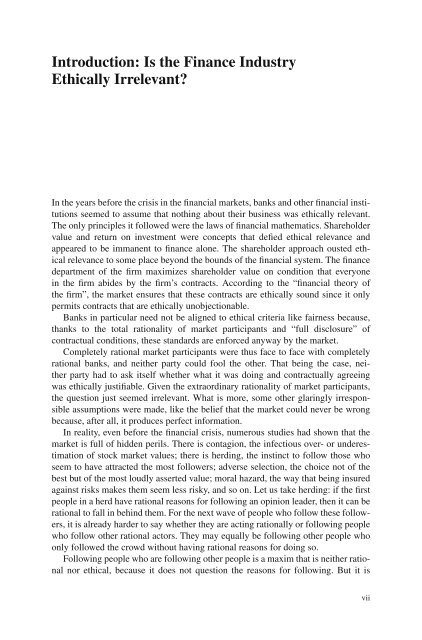The Ethics of Banking: Conclusions from the Financial Crisis (Issues ...
The Ethics of Banking: Conclusions from the Financial Crisis (Issues ...
The Ethics of Banking: Conclusions from the Financial Crisis (Issues ...
You also want an ePaper? Increase the reach of your titles
YUMPU automatically turns print PDFs into web optimized ePapers that Google loves.
Introduction: Is <strong>the</strong> Finance Industry<br />
Ethically Irrelevant?<br />
In <strong>the</strong> years before <strong>the</strong> crisis in <strong>the</strong> financial markets, banks and o<strong>the</strong>r financial institutions<br />
seemed to assume that nothing about <strong>the</strong>ir business was ethically relevant.<br />
<strong>The</strong> only principles it followed were <strong>the</strong> laws <strong>of</strong> financial ma<strong>the</strong>matics. Shareholder<br />
value and return on investment were concepts that defied ethical relevance and<br />
appeared to be immanent to finance alone. <strong>The</strong> shareholder approach ousted ethical<br />
relevance to some place beyond <strong>the</strong> bounds <strong>of</strong> <strong>the</strong> financial system. <strong>The</strong> finance<br />
department <strong>of</strong> <strong>the</strong> firm maximizes shareholder value on condition that everyone<br />
in <strong>the</strong> firm abides by <strong>the</strong> firm’s contracts. According to <strong>the</strong> “financial <strong>the</strong>ory <strong>of</strong><br />
<strong>the</strong> firm”, <strong>the</strong> market ensures that <strong>the</strong>se contracts are ethically sound since it only<br />
permits contracts that are ethically unobjectionable.<br />
Banks in particular need not be aligned to ethical criteria like fairness because,<br />
thanks to <strong>the</strong> total rationality <strong>of</strong> market participants and “full disclosure” <strong>of</strong><br />
contractual conditions, <strong>the</strong>se standards are enforced anyway by <strong>the</strong> market.<br />
Completely rational market participants were thus face to face with completely<br />
rational banks, and nei<strong>the</strong>r party could fool <strong>the</strong> o<strong>the</strong>r. That being <strong>the</strong> case, nei<strong>the</strong>r<br />
party had to ask itself whe<strong>the</strong>r what it was doing and contractually agreeing<br />
was ethically justifiable. Given <strong>the</strong> extraordinary rationality <strong>of</strong> market participants,<br />
<strong>the</strong> question just seemed irrelevant. What is more, some o<strong>the</strong>r glaringly irresponsible<br />
assumptions were made, like <strong>the</strong> belief that <strong>the</strong> market could never be wrong<br />
because, after all, it produces perfect information.<br />
In reality, even before <strong>the</strong> financial crisis, numerous studies had shown that <strong>the</strong><br />
market is full <strong>of</strong> hidden perils. <strong>The</strong>re is contagion, <strong>the</strong> infectious over- or underestimation<br />
<strong>of</strong> stock market values; <strong>the</strong>re is herding, <strong>the</strong> instinct to follow those who<br />
seem to have attracted <strong>the</strong> most followers; adverse selection, <strong>the</strong> choice not <strong>of</strong> <strong>the</strong><br />
best but <strong>of</strong> <strong>the</strong> most loudly asserted value; moral hazard, <strong>the</strong> way that being insured<br />
against risks makes <strong>the</strong>m seem less risky, and so on. Let us take herding: if <strong>the</strong> first<br />
people in a herd have rational reasons for following an opinion leader, <strong>the</strong>n it can be<br />
rational to fall in behind <strong>the</strong>m. For <strong>the</strong> next wave <strong>of</strong> people who follow <strong>the</strong>se followers,<br />
it is already harder to say whe<strong>the</strong>r <strong>the</strong>y are acting rationally or following people<br />
who follow o<strong>the</strong>r rational actors. <strong>The</strong>y may equally be following o<strong>the</strong>r people who<br />
only followed <strong>the</strong> crowd without having rational reasons for doing so.<br />
Following people who are following o<strong>the</strong>r people is a maxim that is nei<strong>the</strong>r rational<br />
nor ethical, because it does not question <strong>the</strong> reasons for following. But it is<br />
vii

















